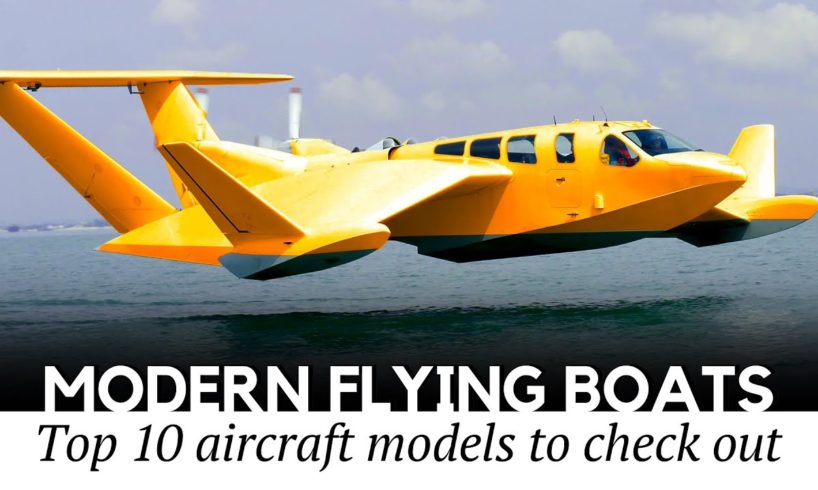
We have already covered modern era amphibious planes that serve within the personal aviation segment, but now the time has come to review larger flying boats and passenger planes with floats. Unlike their smaller siblings, these aircraft not only entertain the rich but also provide invaluable transportation and rescue services within the most inaccessible regions of our planet.
Some of the previously posted #AutomotiveTerritory releases that are dedicated to aviation:
The most advanced electric airplanes and VTOLs that exist today: https://www.youtube.com/watch?v=Hn2JJH6-uAM
Compact seaplanes that you have to see: https://www.youtube.com/watch?v=mA2O1gaz6lM
Detailed list of all models that are shown in this #ATAircraft video:
Dornier Seastar СD2: dornierseawings.com/products/seastar/
This history of this amphibious turboprop goes back to 1984, when it was developed by the German engineer Claudius Dornier Jr. In early,90s the company ran into financial troubles, so its productions efforts were rather scattered from then on. Today, Dornier is a joint venture with two Chinese companies, that invested over 150million euros into the development of the new generation, improved Seastar.
Viking DHC-2T Turbo Beaver: vikingair.com/viking-aircraft/dhc-2t-turbo-beaver
Currently manufactured under the Viking Air, the Turbo Beavers has served as a reliable peoples hauler for more than 60 years. Today its ability to land on and take off from water comes from the Wipline 6100 amphib floats.
Airfish 8: wigetworks.com/airfish-8
The Singapore based Wigetworks however, are attempting to resurrect the concept and hopefully commercialize it as a high-speed ferry with 6 to 8 passengers and 2 crew. The Airfish 8 is a continuation of the reverse delta wing design by the German aviation pioneer Dr. Alexander Martin Lippisch.
Ellison-Mahon Gweduck: gweduck.com/specifications.html
Developed as a successor to the iconic Grumman G-44 Widgeon model, the Gweduck by Ben Ellison and Bryan Mahon originated in Seattle, Washington in 1990. It takes the successful concept of 1940, recreates it in modern composite materials.
Viking Twin Otter: vikingair.com/viking-aircraft/dhc-6-twin-otter
The first generation of this plane first flew the skies back in 1960s under the De Havilland Canada manufacturer and was later produced in several modifications throughout 1980s. The modern era of the Twin Otter began in 2008, when it was brought back to life by Viking Air.
Singular Aircraft SA03: singularaircraft.com
It turns out that drone planes are being rapidly embraced not only by the military or aviation enthusiasts. As demonstrated by Barcelona-based Flyox I, their unique capabilities are paving the way for the future use in agricultural, firefighting, transportation and lifesaving missions.
Kodiak 100: kodiak.aero/kodiak
The French Daher ranks as the number 7 largest manufacturer of aircraft in the world. Their recent acquisition has also put them on the map of amphibious planes producers. Namely, it is the Kodiak 100, formerly delivered under the Quest brand.
Cessna Caravan & Grand Caravan EX: : txtav.com/en/newsroom/media-gallery/aircraft/turboprops/cessna-caravan
The Cessna Caravan range has been in production for almost 40 years now, since 1982, earning a reputation of reliable and adaptable work-horses with low operating costs.
Privateer: privateerindustries.com
Designed by the Boeing engineer Bill Husa and marine engineer Robert Gornstein, the Privateer amphibian will once be sold both as amateur construction kit and a type certified, ready-to-fly aircraft. As of 2020, the model has already completed a couple of flights, and it is being tested and perfected by the Florida-based Pivateer Industries.
Viking Canadair CL-215-515: aerialfirefighter.vikingair.com/aircraft/cl-215t-cl-415eaf-aircraft
The story of the world-renowned water bomber began in 1966. Through the years, the CL 215 went through multiple improvement plans and its latest generations are called CL-415, CL-415EAF and CL-415MP. Moreover, Viking is developing the all-new CL-515 First Responder.
source







To us, it is very interesting, that the Airfish of Widgetworks is presented between a number of waterstarting aircrafts. This fact is supporting the theory, that Airfish is indeed less a boat and more an aircraft. On the other hand, there are no videos showing first Airfish overflying second Airfish or evading the big ship, which is always the argument.
Indonesia big market
16.377 islands
Airfish 8 camper model, for sure..
Well these are all nice and good. I'm looking for something I can live in, with a bathroom and a kitchen and a bed.
Something that sips fuel at .05 gallons per hour has a cruse speed of 400 knots and a range of 15000 nm. I'd like a glide ratio of 120/1 ish
Oh yeah and it has to be fully electric, financeable at 100 USD a month and have leather interior.
If it could land on water I'd go 110 USD.
WHY THE FUTURE PLANE NOT MAKEING HYBRID BOAT PLANE??
both the Viking CANADAIR CL-215-515 & Viking TWIN OTTER seaplane could serve well as a cheap airborne multi role ASW aircraft especially those who cannot afford the B737-800 based P-8I Neptune multi role maritime ASW aircraft!!! it needs long range tanks with in-flight refueling capability & has to be armed as well with guided anti-ship missiles & torpedoes!!!
the nanny, how much credit do you have available to take care of the babies that will arrive from mommy America 2628? there are babies parked in the nursery yard a few blocks from here
Speccing into all ground effect builds was not something I expected seaplane mains to do.
the off-speaker has an interesting accent…south-American or Irish?
Man, that Gweduck almost looks like a PBY Catalina without the strut between the fuselage and the wing. I could easily see it as a decent light transport for remote areas to get time-critical materials and personnel around if it was a bit larger.
>>> ALERT : DANGER 10:09 >> Fuel leak. Dont start engines. Abort mission.
9:13 narrator burps
Nice.
Airfish-8 is not a flying boat, Its an Ekranoplan which was invented by the soviets
Fantastic ..Great video.
Thank you !!
Kodiak is the most versatile
versatility. Like the Viking CL215-515 and have seen them in action many times here fighting fires. I have long loved the idea of seaplanes and have said it would be a good idea to set up a fleet of the Russian Beirev BE200's along the west coast. Like 2 or 3 in each of say Seattle, portland and somewhere along San Francisco-San Diego area. So when the fires get going could call in joint strike coordinating them all to line up and continually drop on it to control OP l and extinguish wildfires. They could be called to anywhere needed. Saving lives and preventing extinction due to loss of habitat. They are jet ppl powered and can fly lots faster than the Viking as well as hauling more than twice the water. Even scooping seawater to douse the would be better than
I like the Gweduck due to the heritage and twin otter for versitility.
Why do so many YouTube docs have these weird, distorted, robotic alien voices doing the commentaries? Can't they find anyone with a normal English speaking voice?
I ended this video at :16 seconds because the producer insists on using a synthetic voice (and a damn poor one, at that). Even a rotten announcer is better than synthetic. Shame on you, cheapo!
😉
Why Be-200, A-42 & GA600 doesn't on the list
Knowing is not enough, let us apply. Thank you.
Where can we park them
but then what is the difference between a flying boat and an amphibious plane ?
Nice , very Nice !!